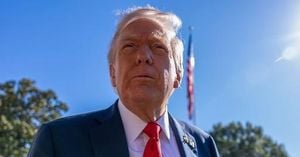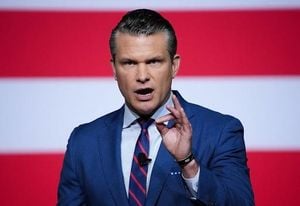Rep. Wesley Hunt’s announcement on October 6, 2025, that he is entering the Texas U.S. Senate race has jolted an already turbulent Republican primary, pitting him directly against incumbent Senator John Cornyn and Texas Attorney General Ken Paxton. With less than five months until the March 2026 primary, Hunt’s bid not only shakes up the GOP field but also signals a broader struggle within the party over its future direction and priorities.
Hunt, a 43-year-old Army veteran and one of the first Black Republicans to represent Texas in the House, has spent months quietly preparing for this moment. Backed by a $6 million statewide advertising campaign and a pro-Hunt super PAC, he’s sought to introduce himself to voters across the state, most of whom know him only as the two-term congressman from a wealthy, majority-white Houston district. According to the Texas Tribune, Hunt’s campaign is centered on issues he believes matter most to Texans: “Texas families, the protection of American energy, the security of our border, and the safety of every community across our great state.”
Hunt’s entry complicates what was already a bitter contest between Cornyn and Paxton. Paxton, a favorite among the state’s most conservative voters, is running despite being mired in federal corruption investigations and having recently survived an impeachment trial that exposed personal scandals. Cornyn, 73, has fought back with millions in negative advertising, eroding Paxton’s early lead, but polls show neither man commanding overwhelming support. Hunt, in his campaign launch, criticized the ongoing feud: “The U.S. Senate race in Texas must be about more than a petty feud between two men who have spent months trading barbs,” he said in a statement reported by NBC News. “With my candidacy, this race will finally be about what’s most important: Texas.”
Hunt’s decision to run has not been well received by the GOP establishment. The National Republican Senatorial Committee (NRSC), whose mission is to protect incumbents, had implored him for months to stay out, warning that his campaign could siphon critical resources from general election contests and risk the party’s Senate majority. “Now that Wesley has chosen personal ambition over holding President Trump’s House Majority, there will be a full vetting of his record,” NRSC spokesperson Joanna Rodriguez said, as reported by NBC News. Cornyn’s senior adviser, Matt Mackowiak, was even more blunt, labeling Hunt “a legend in his own mind” and warning that his “quixotic quest for relevancy” could cost the party tens of millions and endanger the Trump agenda.
Senate leadership, including John Thune and Tim Scott, echoed these concerns, characterizing Hunt’s campaign as a “vanity project” that risks dividing Republican resources. In a memo to donors, they argued that “Cornyn has narrowed the gap with Paxton” and dismissed Hunt’s claims that voters are clamoring for a new alternative. But Hunt pushed back, declaring to the Associated Press, “This is not a vanity project. This is about giving the people of Texas a viable alternative.”
Hunt’s campaign isn’t without financial muscle. He’s reported to have about $3 million in his campaign account, a respectable sum but still less than Cornyn’s $6 million and Paxton’s $2.5 million. Supporters have invested $6.5 million in advertising since spring, though groups backing Cornyn have spent more than $21 million. Hunt’s entry also opens up his 38th Congressional District seat, potentially altering the GOP’s broader strategy in Texas and creating opportunities for both parties down-ballot.
Hunt’s political identity is complex. He’s a staunch conservative and a vocal ally of former President Donald Trump, having been the first Republican to endorse Trump’s 2022 comeback. He’s also pitched himself as the face of generational change, telling The New York Times, “The United States Senate is not a retirement community, and the fact of the matter is, when John Cornyn first got elected into office, I was two years old.” Hunt’s campaign video, released alongside his announcement, highlighted his military service, conservative upbringing, and interracial marriage, underscoring a message of both continuity and change within the Republican Party.
Race and representation are part of Hunt’s story, though he’s quick to downplay their importance in Texas politics. “Quite frankly, I don’t think Texans really care about race,” he told The New York Times, while noting the generational shift his candidacy represents. Texas has never had a Black senator, and Hunt’s run could test the GOP’s efforts to broaden its appeal to young, Black, and Hispanic voters—a demographic shift that party strategists have long said is essential for the GOP’s future viability in the state.
Hunt’s policy priorities are sharply conservative. He’s pledged to make repealing the bipartisan gun control law—negotiated by Cornyn after the 2022 Uvalde school massacre—his first priority if elected. “You cannot author gun control legislation in Texas,” Hunt told The New York Times, a line of attack also favored by Paxton. This position is likely to resonate with the party’s right flank but could further polarize the already divided primary electorate.
Paxton’s campaign welcomed Hunt’s entry, with adviser Nick Maddux stating, “Wesley and General Paxton both know that Texans deserve better than the failed, anti-Trump record of John Cornyn.” Hunt himself has suggested he wouldn’t be upset if Paxton won, describing him as “actually a conservative,” in contrast to Cornyn. This triangulation could help Hunt siphon support from both camps, though it also risks alienating voters seeking a more unified party.
Polling suggests Hunt’s presence is already shifting the dynamics. Recent surveys have shown him drawing support from both Cornyn and Paxton, with at least one poll indicating Hunt could defeat either candidate in a head-to-head matchup. Another found Cornyn narrowly leading in a hypothetical three-way race, with Hunt not far behind. As Politico noted, Hunt’s candidacy has introduced a new level of unpredictability, with Democrats watching closely for any opportunity to capitalize on GOP divisions.
Indeed, the Democratic primary is heating up as well, with former Rep. Colin Allred and state Rep. James Talarico both vying for the nomination. Texas, long a Republican stronghold, has shown increasingly competitive margins in recent elections. Democrats need just four Senate seats to flip the chamber, and national strategists see Texas as a potential—if still challenging—target, especially if the GOP emerges from the primary bruised and divided.
For now, all eyes are on former President Trump, whose endorsement could tip the scales in a race where every faction is vying for his blessing. As of October 6, 2025, Trump has not endorsed any candidate, leaving the field wide open and the outcome uncertain. Hunt, undeterred by establishment criticism and party infighting, insists, “Washington does not get to dictate what happens in Texas. Bureaucrats in D.C. do not choose Texas’ leadership, Texans do.”
With the March primary looming, Texas Republicans face a choice not just between three candidates, but between competing visions for their party’s future. The result could reverberate far beyond the state’s borders, shaping the national balance of power in the Senate and the identity of the Republican Party for years to come.





